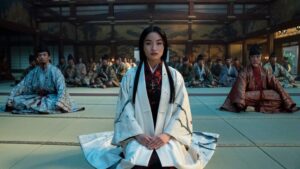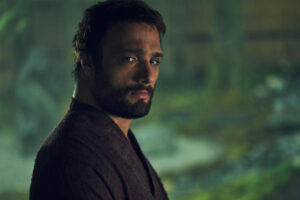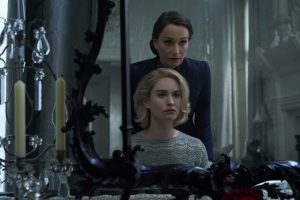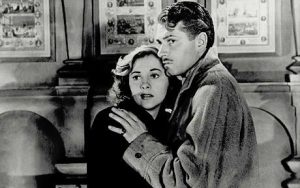MINOR SPOILERS FOR SHŌGUN EPISODES 1 – 2 AHEAD!
Epics. Every streaming service (with the possible exception of Peacock and Paramount+) has one nowadays – a visibly expensive series of breathtaking scale and scope, typically an adaptation of a classic fantasy, sci-fi, or historical fiction novel, boasting inspired cinematography, immersive production design, stunning visual effects, gripping action sequences, an outstanding cast, and in at least a few cases, strong writing to match. Think HBO’s House Of The Dragon, Amazon’s The Rings Of Power, Andor on Disney+, Apple TV’s Foundation, Netflix’s…uh, relentless barrage of live-action anime adaptations and projects set in The Witcher universe? Most of these are good shows. A few are even great. But with high price-tags come even higher expectations, and in this economy it’s not enough to be a good show, or even a great one. You have to be the best, and your first season needs to be an unprecedented success within its weekend of release, or you’re getting canceled. So every one of these shows is inevitably and unfairly measured up to Game Of Thrones, which for one brief shining moment in television history had all of the aforementioned elements in abundance as well as keeping audiences glued to their TVs week-to-week, and most fall short. Heck, even Game Of Thrones itself went from being great to good, to just okay, to downright bad, over the course of its last three seasons, though that didn’t stop the controversial finale from having record-breaking viewership (somewhat justifying the slew of spin-offs and prequels that HBO has greenlit since).

So when I saw that critics were using the phrase “the next Game Of Thrones” to describe Hulu and FX’s Shōgun – a remake of the 1980 miniseries adapted from James Clavell’s best-selling 1975 novel by the same name – I didn’t think too much of it. I’ve heard the phrase misused so many times before that it’s lost virtually any and all meaning that it ever had. There is no “next” Game Of Thrones because streaming doesn’t accommodate that kind of communal viewing experience the way television did for Thrones, and streaming shows are given too few episodes and seasons to gradually prove their value, as Thrones did. Don’t get me wrong, in a fair and just world, Shōgun would absolutely be a cultural phenomenon, maybe even running for several seasons and accumulating dozens of Emmy awards and other accolades along the way to a satisfying series finale, but it doesn’t have to be. What it is, however, is an extremely high-quality production with a fine-tuned script, so in that regard, I suppose it is comparable to early Game Of Thrones, and probably more deserving of the comparison than most.
Now, I’ll confess, I’ve never seen the original miniseries and only read about a quarter of the book before putting it down, as I recall being unmoved by Clavell’s writing style and suspicious that the protagonist would turn out to be a white savior (though I’ve heard that’s not the case), so this reimagining of Shōgun wasn’t on my radar until fairly recently. But that only makes the pilot episode more of a triumph, in my opinion, because even without much prior knowledge of the story I was hooked in almost instantly – by the artistry, authenticity, and attention to detail on display in every frame, by the magnificent performances from the entire cast, and by the subversive score from Atticus Ross, Leopold Ross, and Nick Chuba.
This adaptation’s smartest and most significant deviation from the source material is in putting the focus squarely on Shōgun‘s Japanese characters, thereby gently nudging English explorer John Blackthorne (Cosmo Jarvis) into a secondary role for which he’s much better suited. He still functions like a window for (white, Western) viewers into the (to white Westerners) unfamiliar world of feudal Japan throughout the first episode, but Shōgun trusts its audience not to need him after a certain point and to come join the party on the other side of that window where all the really interesting stuff is happening, leaving Blackthorne to just keep strutting around confidently – and most amusingly – as if he’s the protagonist, while in reality, he’s unknowingly being used as a pawn in the power struggle between Yoshii Toranaga (Hiroyuki Sanada) and the other warlords on Japan’s ruling Council of Regents, spearheaded by Ishido Kazunari (Takehiro Hira).
Sanada, who also serves as a producer on Shōgun and was instrumental in getting this series made in the first place and, furthermore, made with historical accuracy front-of-mind, needs virtually no introduction after more than fifty years spent working across every medium and genre, but outside Japan, audiences far too rarely get a chance to see him in starring roles (in Hollywood blockbusters, most egregiously in Avengers: Endgame, he’s often cast as expendable sword-wielding villains). Shōgun rectifies that. Sanada lifts a sword only once in the first two episodes, and his most memorable scenes have him employing carefully-selected words and precipitous silences as his weapons of choice in negotiations with his enemies and prospective allies. With any stoic and seemingly unshakeable character, there is a balance that must be skillfully maintained to convince the audience of both their humanity and their almost inhuman composure in equal parts, and Sanada walks that invisible line with such ease that you simply have to marvel. It is especially evident through his profoundly intimate conversations with Toda Mariko (Anna Sawai), a noblewoman of his house whom he appoints to be Blackthorne’s translator, that Toranaga’s sincerity and his solemnity are not in conflict nor in danger of canceling each other out, but in fact conspire to keep him on the path to victory.

Mariko, on the other hand, finds herself torn in different directions by her loyalty to Toranaga and her commitment to her Catholic faith, after Blackthorne’s arrival brings with it the chilling revelation that the Portuguese missionaries embedded in Japan are but the forerunners of a brutal empire that would absorb the country and eradicate its culture. In the middle-ground, that limitless sandbox, Anna Sawai sculpts the series’ most complex and formidable character, who must overcome obstacles that do not exist for the men around her if she intends not only to survive the dark days ahead but carve out a path for herself across blood-soaked battlefields. Her performance is made up of subtle, immensely purposeful movements – the merest flicker of the eyes conveys a hundred emotions.
The cast are backed up by a clean, concise script from Rachel Kondo and Justin Marks (among others) that moves between Japanese, English, and English-representing-Portuguese (one of the few immersion-breaking choices in the series, but ultimately a small grievance to hold against it). The original miniseries notoriously shunned the use of subtitles, a decision one could conceivably praise as subversive if it weren’t made with the explicit intention of shackling the series’ majority non-Japanese speaking audience to the viewpoint of the white Western protagonist, Blackthorne. All this while also aggressively whittling down the book to focus exclusively on Blackthorne, discarding many of the Japanese characters, their subplots, and with them, just about everything I can think of that makes Shōgun worth adapting in the first place. As I’ve mentioned, this new iteration of the story distributes the focus more evenly amongst its cast, denying us access to no crucial scene because Blackthorne isn’t there to witness it.
While I am by no means qualified to speak over actual historians, Japanese historians in particular, as to everything that Shōgun gets right (or wrong; in a production of this scale, it would be shocking if a few small inaccuracies didn’t slip past even the most hands-on cultural consultant, but I have not yet come across any), it has been heartening to hear the whole cast and crew emphasize the importance of telling this story as truthfully as possible, with Japanese creatives in key positions behind the camera as well as in front of it, and to have this further accentuated by the series’ clear, crisp lighting that ensures no aspect of the set design, costume design, or visual effects used to reconstruct entire early 17th Century Japanese cities and castles on Vancouver backlots is lost in the literal darkness that has subsumed so much of modern television as a quick fix for dodgy CGI and cheap wigs. There is a tangible sense of age and wear and depth to every set, every costume, every prop and piece of furniture, on this show.
Now, to be clear, lavish production design is only half the battle in making a visually outstanding piece of television. Good lighting also helps, but cinematography is crucial. I can think of several shows with genuinely beautiful set decoration and costumes and whatnot, that are burdened down by conventional cinematographers who prioritize blunt efficacy over artistry. Shōgun does not suffer from that problem, at least not under Christopher Ross (Ross, whose credits most shockingly include the film adaptation of Cats, only worked on the first two episodes). Intentionally or not, the elegant composition of each shot heavily evokes the artform of Japanese garden design, and many of the same design elements that go into creating these three-dimensional structures, concepts such as empty space, enclosure, and borrowed scenery, can be found in the texture of Shōgun‘s cinematography, albeit adapted for the stark rectangular confines of a television or phone screen.

Debuting with a perfect score of 100% on Rotten Tomatoes, which it was able to hold for a couple of days before dipping by a single point based on a single review, Shogun is poised to remain one of the highest-reviewed series’ of the year, and there is no doubt in my mind it will be a strong contender at next year’s Emmys in practically every category (it’s being called a limited series, but that term is used somewhat…liberally, these days). On every front, it is a mighty force. If that holds true throughout the remainder of this season, it may well be that future epics of this staggering scale and exceptional quality will no longer be measured up next to Game Of Thrones, but to Shōgun. Ideally, we would do away with the comparisons altogether, as they help pretty much nobody, but I for one would probably consider it the greatest honor of my life to someday have my work mentioned in the same breath as this masterpiece.
Review: 10/10



